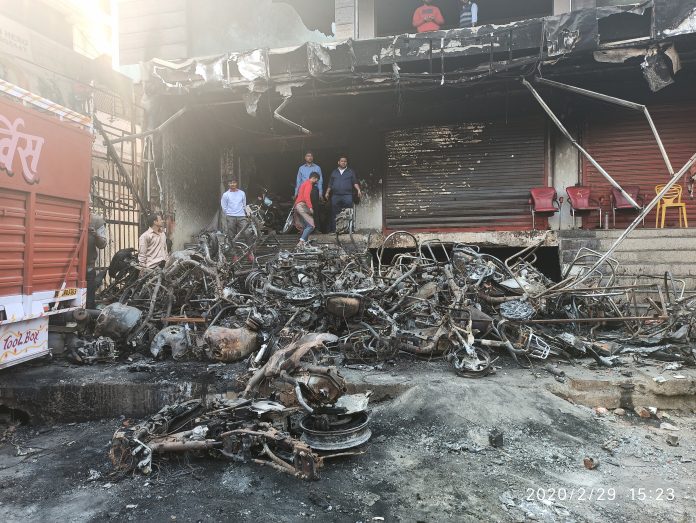Yusuf Ansari, twocircles.net
A week after grim stories are being uncovered from hospitals, mortuaries, and police stations, it seems there is no end to misery for Muslims affected by the northeast Delhi riots. Muslim families who are already shaken by the worst communal violence in decades in the Capital have more to suffer as ground reports from the areas affected by violence suggest Hindu landlords and shopkeepers do not want to rent or sell the property to Muslims in these localities. Residents from the Muslim community of Shiv Vihar, Bhagirathi Vihar and Khajuri Khas who are now returning to their homes say that they are being outright denied from renting owning residential spaces by the area’s Hindu housekeepers and owners. What is worse is, the local police are refusing to register such complaints.

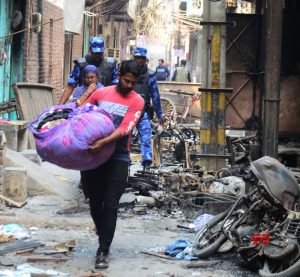
One such case is from Shiv Vihar that was torched and attacked by rioters on the night of February 24. During this rampage, rioters not only burnt down houses belonging to Muslims, but also looted their shops. Whereas, the houses and shops owned by Hindus were safe from any damage or theft except for the portions that were rented to Muslims in these property holdings. Initially, the residents from Shiv Vihar whose houses were burnt had taken refuge in Mustafabad. They then moved inside the transit camps built within the Eidgah.
Such well planned and schematic manner of violence only in Muslims pockets brings has more to it than what meets the eye. Muslims have lost their lives and property but they now face deeper social isolation once they engage in rebuilding and rehabilitation. Added to this is the trauma they carry of the scenes and images they carry from the riots that will haunt them forever. The residents whose houses have been burnt down, do not want to go back to these localities because their trust in their neighbors and police are not completely shattered. Those who lived in rented houses owned by Hindus, tried to return but were instantly refused. The only one thing they were allowed for was to take back their belongings – the little of what remained from being burnt or desecrated. When they tried to approach police regarding this social isolation, the police took no interest in filing any report or taking any action for the same. Devastated, they returned to the relief camps.
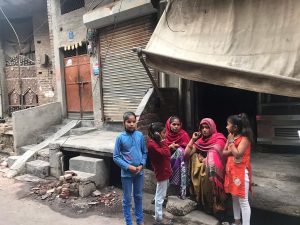
“My landlord has asked me to leave this place now,” said Imran, who stays in a rented flat in Lane 12 of Shiv Vihar with his family. Imran’s parents own a house in Lane 6 while his brother stays in Lane 10 with his family. Both the brothers narrated how the house owned by their parents in Lane 6 was first looted, then burnt by the rioters last week. Both Imran and his brother, for the fear of more boycott, have not returned to their rented houses in Shiv Vihar yet, but their Hindu landlords have sent them the message through someone to evacuate the flats as early as possible.
Social worker Sheeba Aslam Fahmi said a Muslim woman had called her seeking help. She told Sheeba on the phone that she was calling from Lakshman Enclave, around Madina Masjid in Shiv Vihar Phase 2. She informed Sheeba that many Muslims like her, from Phase 2 and Phase 6 in Shiv Vihar are unable to return to their homes because of this discriminatory distinction on the basis of faith. She further added that police has been of no help except that they have allowed the Muslims residents from these areas to collect their belongings, that too, only from houses that are originally owned by Hindus. Houses that were owned by Muslims landlords are either tattered or are now occupied by Hindus. Muslims who owned property in Shiv Vihar, when returned to reclaim them, were turned away by the Hindu locals saying they will not be allowed to reside in the vicinity anymore. All of this has happened in broad daylight in the presence of police.
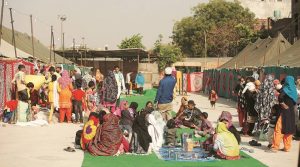
This is the same for all the riot-hit areas in Delhi. Either the Muslim properties have been burnt, or they are being openly threatened by Hindu locals to not return to their homes. Some victims have also complained that flats and shops owned by Muslims in these areas where nothing has happened are now being marked and emptied one by one.
“Budhwar ko jab mai apne dukaan par pahuncha toh maalik ne dukaan kholne tak nahi di mujhe” (When I returned to my shop on Wednesday, the shop owner didn’t let me open the shop), said Yameen from Bhagirathi Vihar who worked in a shop owned by a Hindu, in the same locality. He further informed that rioters, on seeing a Muslim, had entered the shop and looted it on February 25 during the massive violence. He added that the Hindu owner did not let him take his belongings kept inside the shop and when Yameen went to lodge a complaint at a police station, the police refused from filing any FIR.
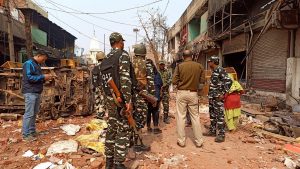
In the Chowk Bazar at the Red Signal of Khajuri Khas stands a flourishing trading building housing about 20 to 25 shops, offices and flats for rent. At the ground floor of this building, the only shop by a Muslim was Salim Ahmed’s. Salim dealt in a battery business but now his shop is the only one that is badly charred due to burns. Broken and burnt metals and pieces of batteries equipment could be seen lying on the floor laced with ashes. One burnt shop of a Muslim surrounded by safe shops of Hindus at this Chowk Bazar did not surprise anymore.
The first floor at one such business quarter in Mustafabad houses a property dealing office of the local leader, Asghar Ansari. The hoarding outside his shop is missing. Maybe that is why the office was safe from the targeted wrath of the rioters. However, the owner of this property has warned Asghar to vacate the premises soon, due to pressure from locals.
This increasing socio-economic isolation of Muslims after the targeted violence is like a death blow to the minority community. While the government is yet to respond with relief and compensatory measures, various social organizations are reaching out with food, clothing, and medicines other than a shelter for the victims. For now, the major concerns each day for the displaced Muslims is breakfast and lunch, but how long will this cycle continue? In the transit tents and relief camps, life is being supported somehow but how will those who have lost everything, get back to normalcy? Will, there be continued support from the government and social organizations or will the lack of support become another blow to their miseries?

